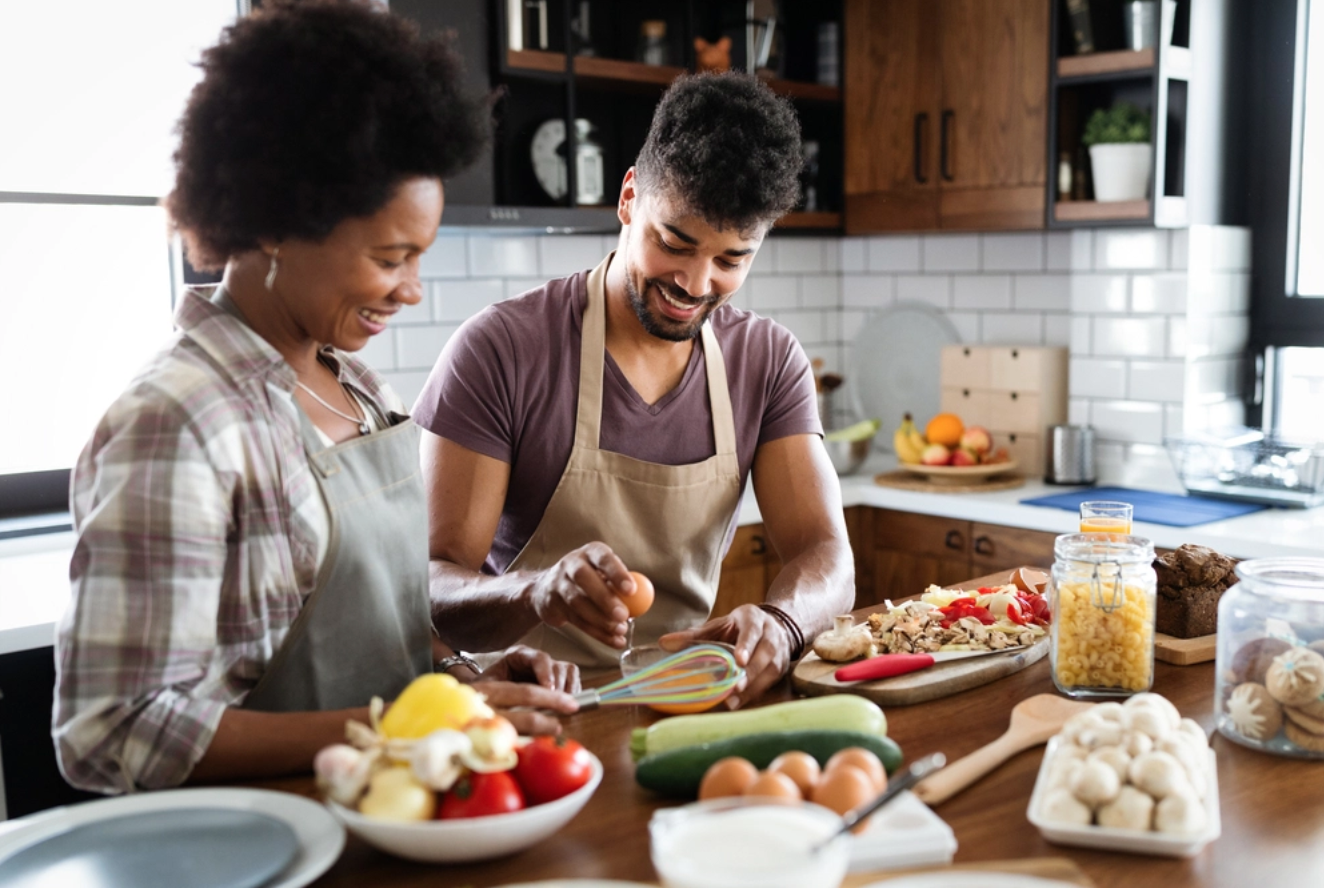The concept of eating well means something unique to each of us. Maybe it has to do with fueling your body with nourishing foods, or listening to what your body needs without restricting, or even using food as a way to connect with loved ones. Whatever it may be, Microsteps can help us stay consistent with our habits so that we can commit to eating well for the long-term.
We asked our Thrive community to share with us the Microsteps that have helped them enjoy eating well and stick with it. Which of these will you try?
Plan your meals for the week on Sundays
“Mapping my meals out on a Sunday has been revolutionary for my eating habits. Thinking ahead gives me the time to research healthy meals that actually taste great while simultaneously reducing the number of decisions I need to make the following week, reducing any decision fatigue. Decision fatigue can lead to difficulty making the right decisions, impulsive decision-making, or not making a decision at all. By creating a meal plan, you not only increase your chances of eating well, but you also save your decision-making power for the things that really matter.”
—Charlotte Swire, wellness practitioner, Manchester, UK
Swap recipes with a friend
“Whenever I start something new, like eating healthier, it always helps to have a friend join in. One easy way to do this is to swap healthy recipes. It cuts planning in half and is a great way to connect over modifications. And if you can find more than one friend to join in, the more the merrier!”
—Joe Kwon, coach, Oakland, NJ
Chop up your produce in advance
“My Microstep is something I call ‘shop-n-chop.’ Previously, I’d buy all my produce with good intentions. Invariably, the food would fall to the bottom of my produce drawer and I’d end up throwing it out. Now, when I come home from the grocery store, I chop up everything so it’s ready to go! I find I eat more salads, fruits and vegetables because the hard work is done!”
—Nicki Anderson, Director of Women’s Leadership Program at Benedictine University, Lisle, IL
Pause to ask your body what it needs
“The one Microstep that’s actually helped me start eating better is pausing and listening to my body. What do I actually need? What am I craving? Is it something refreshing? Tangy? Savory? Sweet? Then, I make a healthy choice from there. That’s helped me eat more mindfully, which is more sustainable than any diet out there.”
—Alexi McKinley, marketing strategist, Marysville, WA
Cook with loved ones
“I find it helpful to cook and enjoy my meals with others. While I try to eat at least one meal a day with my wife and two teenagers, over the past two summers as part of our UK staycations, we’ve used food and wine to create an ‘event’ during our breaks. This year, I recreated a menu from a favorite restaurant we visited in Sonoma in 2019. I found the menu on the restaurant’s website and enjoyed sourcing and cooking fresh ingredients. We enjoyed a wonderful family evening together.”
—Jamie Butler, executive coach and facilitator, Hampshire, UK
Make your lunch in the morning
“I find that getting up early, at around 6:00 am, gives me a few hours to sort out things like my breakfast and lunch. This is important when I’m working from home, because more often than not, I’m too busy around noon to prepare lunch. Preparing my meals in the morning helps me prepare for the day.”
—Parvathi Vijayamohan, product marketer, Kochi, Kerala
Use small cooking swaps
“Eating well for me started with making small swaps. One example is sautéing with water when cooking vegetables on the stove. For baking, I use applesauce or nut butter mixed with a bit of water. Even in foods such as hummus, I spice up the recipe and use water rather than oil. It is a small change that has resulted in a big benefit, with no compromise on flavor.”
—Cathy Connally, co-author of Flavour with Benefits: France, Canada
Grow your own vegetables
“The pandemic has certainly been a challenge for me in terms of my eating habits, but I’ve found joy in trying new healthy recipes that I see online, especially salads. I am growing some of my own fruits and vegetables and I now frequent the local farmers market on the weekends to expand my palate. The combinations of flavors and textures really keeps me excited.”
—Suzanne Schnaars, engineer, Basking Ridge, NJ
Choose a “slow snack”
“When craving something to munch, I try reaching for a ‘slow snack.’ Instead of mindlessly destroying a bag of popcorn, I pick through a bowl of pistachios, for example. The shell stops me from shoving 20 of them in my mouth at once, which helps my body have time to realize when it’s full. Edamame, sunflower seeds, and pomegranates are other great ‘slow snack’ ideas. This Microsteps helps me stay consistent and I don’t feel deprived.”
—Dr. Kate Lyzenga-Dean, functional medicine consultant and author, Grand Rapids, MI
Try one new recipe each month
“One Microstep that has helped me is trying one new healthy recipe at least once a month. This becomes a fun process that makes my meal more enjoyable because of the positive energy I put into it.”
—Kristin Meekhof, author, Royal Oak, MI
Follow us here and subscribe here for all the latest news on how you can keep Thriving.
Stay up to date or catch-up on all our podcasts with Arianna Huffington here.


